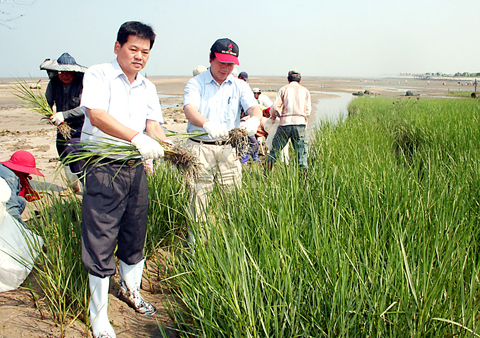Kinmen, Taiwan’s famed defense outpost, has been prepared for more than half a century to defend against a military invasion by China. While no enemy troops have crossed the waters in that time, a strain of salt-marsh grass has infiltrated the island and threatens its coastal ecology.
The Kinmen County Government on Tuesday launched a battle against “smooth cord grass,” urging county residents to join the fight to protect the island’s coastal ecological system.
More than 100 county government officials, agricultural experts, Kinmen National Park rangers and representatives of local community development associations attended a training program organized by the county government to learn how to weed out the grass, an invasive species that has already swallowed 10 hectares of beaches along the northern coast.

PHOTO: CNA
The grass, a native of the Atlantic coast of the US, is a medium-to-large-sized saltwater plant that grows in wetlands.
The Kinmen Public Works Bureau said the plant was introduced to China in 1979 because of its saltwater-resistant nature. Its solid stems and roots can help shore up sandy seashores or riverbanks.
Unexpectedly, however, the plant, which grows quickly and has high adaptability, rapidly took control of China’s southern coastal areas, drying out salt marshes along the coast and turning beaches into solid land with interlocked woven stem vines, and obstructing ships from sailing into harbors.
The stubborn grass was brought to Kinmen by sea tides, waves and migrant birds about 10 years ago and soon found a new home on the island’s sandy beaches and tidal flats, the bureau said.
Since then, the grass has triggered an unprecedented ecological disaster in Kinmen, Kinmen County Government Secretary-General Lu Chih-huei (盧志輝) said.
A mangrove wetland on the mouth of Kinmen’s Wuchiang River is facing the greatest threat from the plant, Lu said.
“It has not only blocked the navigational route and worsened the quality of sea water, but also triggered a red tide. Local people see it as a pest,” he said.
The local government’s field surveys show that the non-native grass has dried part of the wetland and because of its strong grip on beaches, the grass obstructs the natural activities of crabs and even threatens the survival of other coastal organisms, such as mudskippers.
Last year, the county government began a weeding program, but it failed because officials did not realize the grass cannot be killed without having its roots pulled out.
Opting not to use weed killers or herbicides to avoid another and possibly greater ecological disaster, the county government has been searching for a way to get rid of the hostile invader, Lu said.
After months of tests on possible measures to stop the stubborn grass from spreading, officials finally found that the best way to destroy the plant was to pull out its roots and then bury them in a 3m deep hole.
Experts have found the grass cannot grow at such a depth, Lu said.
The county government is hoping local residents can help it remove the pest for good.

Taiwan would benefit from more integrated military strategies and deployments if the US and its allies treat the East China Sea, the Taiwan Strait and the South China Sea as a “single theater of operations,” a Taiwanese military expert said yesterday. Shen Ming-shih (沈明室), a researcher at the Institute for National Defense and Security Research, said he made the assessment after two Japanese military experts warned of emerging threats from China based on a drill conducted this month by the Chinese People’s Liberation Army’s (PLA) Eastern Theater Command. Japan Institute for National Fundamentals researcher Maki Nakagawa said the drill differed from the

‘WORSE THAN COMMUNISTS’: President William Lai has cracked down on his political enemies and has attempted to exterminate all opposition forces, the chairman said The legislature would motion for a presidential recall after May 20, Chinese Nationalist Party (KMT) Chairman Eric Chu (朱立倫) said yesterday at a protest themed “against green communists and dictatorship” in Taipei. Taiwan is supposed to be a peaceful homeland where people are united, but President William Lai (賴清德) has been polarizing and tearing apart society since his inauguration, Chu said. Lai must show his commitment to his job, otherwise a referendum could be initiated to recall him, he said. Democracy means the rule of the people, not the rule of the Democratic Progressive Party (DPP), but Lai has failed to fulfill his

OFF-TARGET: More than 30,000 participants were expected to take part in the Games next month, but only 6,550 foreign and 19,400 Taiwanese athletes have registered Taipei city councilors yesterday blasted the organizers of next month’s World Masters Games over sudden timetable and venue changes, which they said have caused thousands of participants to back out of the international sporting event, among other organizational issues. They also cited visa delays and political interference by China as reasons many foreign athletes are requesting refunds for the event, to be held from May 17 to 30. Jointly organized by the Taipei and New Taipei City governments, the games have been rocked by numerous controversies since preparations began in 2020. Taipei City Councilor Lin Yen-feng (林延鳳) said yesterday that new measures by

A rally held by opposition parties yesterday demonstrates that Taiwan is a democratic country, President William Lai (賴清德) said yesterday, adding that if opposition parties really want to fight dictatorship, they should fight it on Tiananmen Square in Beijing. The Chinese Nationalist Party (KMT) held a protest with the theme “against green communists and dictatorship,” and was joined by the Taiwan People’s Party. Lai said the opposition parties are against what they called the “green communists,” but do not fight against the “Chinese communists,” adding that if they really want to fight dictatorship, they should go to the right place and face